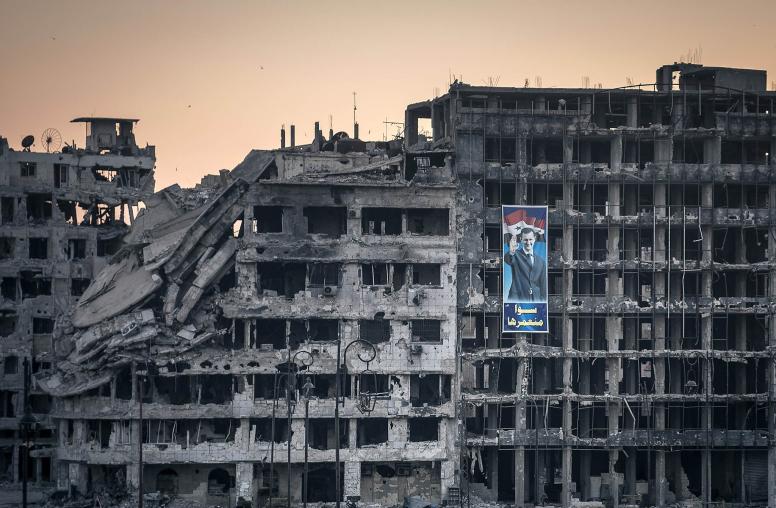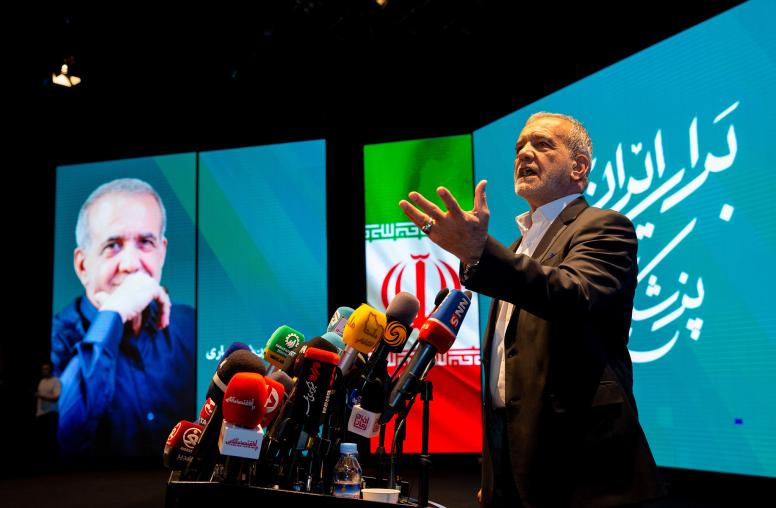Research & Analysis
U.S. Institute of Peace’s articles, reports, tools and other features provide policy analysis, research findings, and practitioner guides. These publications examine critical conflict issues at the center of the Institute’s work to prevent and resolve violent conflict.
The views expressed in these publications are those of the author(s).

What Does ‘Maximum Pressure’ on Iran Mean for Iraq?
On March 8, the United States allowed a waiver to expire that had permitted Iraq to buy Iranian electricity. The move was the latest in the Trump administration’s “maximum pressure” campaign to cut off Iran’s revenue streams and push Tehran to negotiate over its controversial nuclear program. The waiver dates back to President Trump’s first term. In 2018, Trump withdrew the U.S. from the 2015 Iran nuclear deal, which had granted Iran sanctions relief in return for curbing its nuclear program and expanding cooperation with the U.N. nuclear watchdog.

Iran and Russia Are the Biggest Regional Losers of Assad’s Fall
Among the central factors that led to the ouster of Syrian dictator Bashar al-Assad was Iran’s and Russia’s decisions to not intervene yet again to prop him up. Tehran had long used Syria as vector to project influence in the region and marshalled significant resources and manpower to keep Assad in power when the Syrian civil war erupted in 2011. Moscow similarly saw its ties with Assad as a source of regional influence, and its 2015 intervention in Syria was decisive in Assad maintaining his stranglehold on power.

What’s Next for Israel, Iran and Prospects for a Wider Middle East War?
Early Saturday morning in Tehran, Israel carried out what it called a series of “precise and targeted” airstrikes on Iranian military targets. This was the latest in a series of direct exchanges between Isarel and Iran in recent months. Israel Defense Forces struck 20 sites, including air defense batteries and radar, factories for missile and drone production, and weapons and aircraft launch sites. Israeli Prime Minister Benjamin Netanyahu announced that the attack had "severely damaged Iran’s defense capability and its ability to produce missiles.” The Iranian government announced the deaths of four military personnel and one civilian, but otherwise took a more measured response than might be expected.

Hassan Nasrallah is dead. What happens next in the Middle East?
Two weeks ago, Israel announced that halting Hezbollah attacks had become an official goal of its post-October 7 war effort. Since then, Israel conducted a sophisticated clandestine attack on Hezbollah’s communications infrastructure and struck numerous Hezbollah targets in southern Lebanon and the suburbs of Beirut, killing many of Hezbollah’s senior leaders. Then, on Friday, an Israeli airstrike assassinated Hezbollah’s leader, Hassan Nasrallah, who led the group for over 30 years.

What the Houthi-Israel Exchange Might Mean for Escalation in the Middle East
The Middle East saw yet another escalatory episode over the weekend, as Israel and Yemen’s Houthis exchanged fire. On July 19, the Iran-backed Houthis launched an unprecedented drone attack on Israel, which hit an apartment building in downtown Tel Aviv, killing one and injuring at least 10 others. It was the first time that the Houthis killed or even harmed an Israeli, despite launching dozens of missile attacks on Israel since October 7. The next day, Israel struck back with an airstrike on the strategic port of Hodeida, marking the first time it attacked Yemen. The Israeli attack killed six, injured dozens more and left ablaze key oil facilities in the area.

What You Need to Know About Iran’s Election and New President
In a clear challenge to regime hardliners, Masoud Pezeshkian, a reformist and cardiac surgeon, won Iran’s snap presidential election on July 5. The elections were called after President Ebrahim Raisi died in a helicopter crash on May 19. The runoff had been considered a tight race, but Pezeshkian won decisively with almost three million more votes than Saeed Jalili, a hardliner and former nuclear negotiator. Due to take office in August, Pezeshkian, a former deputy speaker of parliament and health minister, will take power as Iran’s government faces legitimacy challenges amid an economic crisis.

What’s Next for Iran After Raisi’s Death?
On May 19, Iranian President Ebrahim Raisi, Foreign Minister Hossein Amir-Abdollahian and six other passengers and crew died in a helicopter crash. The aircraft went down in dense fog in a mountainous region of East Azerbaijan province in northwestern Iran. The officials were returning from the opening ceremony for a dam on the border with Azerbaijan. Less than 72 hours after Raisi’s death, the focus has turned to the political changes that come next with elections slated for June 28.

The Pivotal Elections of 2024: Key Races That Will Shape the Global Landscape
Around 2 billion people in more than 50 countries, including India, Chad, Mexico and South Africa, will go to the polls this year in what has been described as the Super Bowl of elections. From major democracies to emerging nations, the outcomes of these votes will undoubtedly play a crucial role in shaping the future trajectory of countries around the world. While some elections could produce conflict, most will take place under the threat of disruption — all of this will have serious implications for U.S. foreign policy and security.

What You Need to Know About China’s Saudi-Iran Deal
Iran and Saudi Arabia announced last Friday a Chinese-brokered deal to restore relations. After decades of enmity and a formal cutting of ties in 2016, the rapprochement has been touted as a momentous development in the region. But how it ultimately impacts the Middle East remains a very open question, as the long adversarial powers are fighting a proxy war in Yemen and continue to support opposing sides across the region. Amid perceived U.S. retrenchment from the Middle East, the deal is a diplomatic win for China as it increasingly seeks to present an alternative vision to the U.S.-led global order.

Takeaways from Blinken’s Trip to the Middle East
The Middle East has not been a high priority for the Biden administration thus far, with issues such as Russia’s war in Ukraine and escalating tensions with China taking precedence. However, recent developments in the region are catching the administration’s attention, and Secretary of State Antony Blinken’s visit to Egypt, Israel and the West Bank earlier this week sought to reaffirm U.S. engagement in the Middle East amid political turnover in Israel, spiraling violence in the Israeli-Palestinian arena, stepped-up Iran-Israel tensions and a deepening economic crisis in Egypt.